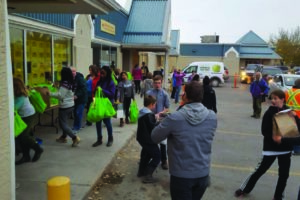Marina’s Picks is a regular feature from CanadaHelps CEO, Marina Glogovac, highlighting some of the many charities she is personally passionate about. As a champion for smaller charities, Marina wants to help fellow Canadians discover some of the lesser known organizations that are working to make our communities better.
Thanksgiving in Canada summons warm feelings of family gatherings and fall harvests for many; but for those that have never experienced hunger, it is easy to forget that 1 in 8 Canadian households is food insecure. Across Canada, food banks and other charities are working to fill the gaps left in our social systems.
The Food Bank Society of Whitehorse is one such charity. It has served the capital city of Whitehorse, Yukon with its population of approximately 33,000 people, since opening its doors in 2009. But when COVID-19 struck, the work of this northern food bank changed dramatically.
The food bank regularly distributed approximately 900-1200 emergency food hampers a month before 2020, but the need quickly jumped nearly 60% after the pandemic was declared. “Our whole world changed and we shifted rather suddenly,” says Dave Blottner, Executive Director of the food bank. “We went from serving just Whitehorse to finding out that most of the nearby communities were in need. Things just grew and grew.”
Food support programs in the small communities surrounding Whitehorse, such as weekly shared meals that provided leftovers to local elders, or other community events that provided meals, were shuttered due to public health rules. “That fundamental piece of food security in the North had broken.”
The Yukon is large geographically, making up 474,712 square kilometres — about 5% of Canada’s land area — but is home to only 0.1% of Canada’s population. The decision to broaden their reach in a crisis was bold — pivoting to serving communities 200, 400, even 800 km away from their base in Whitehorse, including a small community in the far north that can only be reached by plane. They are likely serving the largest geographical area in Canada of any single food bank.
During the pandemic they also started a meal program in Whitehorse, offering meals through a window service to anyone who required it. They are currently distributing 1,900 food hampers a month, as well as distributing food to smaller communities as part of the Canadian Food Surplus Rescue Program that diverts excess food to organizations addressing food insecurity and to avoid food waste. Their costs have increased dramatically, but Blottner credits the generosity of the community and the ease of accepting donations online as what enabled them to expand their work so quickly.
With their broadened reach has come new challenges to navigate. They had to develop a distribution system, as well as partnerships in communities with institutions and each self-governing First Nation. There are more volunteers to coordinate to receive deliveries and ensure food gets where it needs to go. Remarkably, the Food Bank Society of Whitehorse does not have core funding from any government institution; they instead rely on the generosity of individual and corporate donors for much of their funding, as well as an army of volunteers in Whitehorse, and now across the Yukon.
In Whitehorse they are now a distribution hub — the food comes in and gets packaged and goes back out. “We have volunteers, like the good folks up in Haines Junction, who are standing there on a snowy cold morning waiting for a truck to come in so they can unload it, and fill it into 5 different trucks. The new trucks, also driven by volunteers, deliver to all the reaches in that area to get food out to the elders who can’t go anywhere. That’s a huge amount of volunteer power — just an unfathomable level.”
Blottner agrees that the food needs in the Yukon are far too high for such a small place. “We’re in the midst of a major housing crisis right now. Regular folks can’t afford a house, and others have to decide: am I buying groceries or am I paying rent or my mortgage next month? That’s not a place that anyone should be in, ever. Whenever housing is in flux, that pushes poverty to the forefront. I expect we’re going to see things get a little bit worse before they get better.”
The experience of the last 20 months has changed the way the food bank is looking at its future strategy. “We’ve really started looking at food security in the long term now — it’s not sustainable for us to just ship food to the communities forever.” They are in discussions with local communities on how they can help them be more food secure, such as looking at how food can be taken care of locally and grown locally, how prices can be kept affordable, and how locals can have better access to the food they need.
As the upcoming holiday reminds us all to give thanks, the privilege of having food on the table should not be taken for granted. The pandemic has highlighted great need in our country, but it has also given us the opportunity to support each other to get through this tough time. I know I’m thankful for charities like the Food Bank Society of Whitehorse, and the tens of thousands of other charities in Canada that make our communities stronger.

I encourage you to check out and support this inspirational charity that is working so hard to support the community it works in. Learn more about The Food Bank Society of Whitehorse on their website, or make a gift through their CanadaHelps Charity Profile.

3 Responses to “Marina’s Picks: The Food Bank Society of Whitehorse”
J. Hassan
This COVID-19 Pandemic has taught us a thing or two about charities. Houses of Worship — the mainstay of charitable work, according to many — have had to cut back their activities drastically due to the lockdowns and other restrictions put in place in the wake of the Pandemic. Food Banks, Soup Kitchens and similar organizations, on the other hand have stepped to the fore, delivering their services to an increasingly wider base. Your call to support food banks is most timely. Even in the religious communities there are many who believe that true worship is through the service of fellow man. More power to you!
•Allen Mc Donald.
I had an opportunity to work on the Alaskan Highway in 1964, but it was no longer open when I applied. I am long passed my productive years, but not passed when I can offer some assistance.
•Dan Husband
Food Security is a basic human right!!!! Sometimes in our consumerist way of thinking we forget this, we take for granted the abundance we are blessed with. I just spent a very enjoyable Thanks Giving together with my Son. I am not the only one who should be able to enjoy good food and company with a loved one. God Bless those who work to see that these needs are more readily available to all.
•